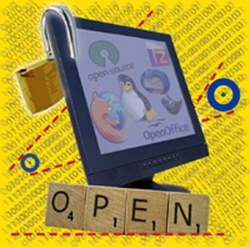Cuba turns towards free software
- Submitted by: admin
- Computers and Internet
- Society
- Science and Technology
- 03 / 20 / 2009

Only 5% of computers from the General Custom of the Republic use Windows and the remaining 95% lend their service over a free software platform. This institution was the pioneer in Cuba when the country began its migration in 2005. On April of the previous year, the Council of Ministries agreed that the island had to move from this open code system but a deadline was not settled, it was told that a continuous and organized process should be implemented, then a National Executive Group is created and led by the Minister of Informatics and Communications.
Other bodies already join the Custom in this work, among them, the Ministries of Informatics and Communications (MIC), Higher Education (MES) and Ministry of Culture (MINCULT), also the Enterprise of Telecommunications of Cuba (ETECSA), but the rector in the Cuban strategy towards this transfer is the University of Informatics Science (UCI).
The Fourth International Workshop of Free Software, recently held in the country, was the space chosen for the presentation of the Cuban Guide for the changing from the open code system. This will be the main document by means of which enterprises and institutions will organize and develop their own transfer according to their characteristics in every place. Within this strategy, a capacity building program is foreseen and the slow introduction of the free software in all teaching levels and specifically in the Computation Youth Clubs that will be the ideal space for a mass training.
Hector Rodríguez, Dean of the 10 Faculty at UCI is at the head of the National Group for the Free Software Transfer, who explains the reasons for this necessary change.
We must migrate for three reasons in our country: One of them is independence, since no sovereign country must be based on the use of a technological tool responding to a monopoly, in this case Microsoft and even less Cuba, that is under a strict and longest blockade ever known in history. Instead, the free software (FS) is based upon the peoples’ equality, their philosophy is sharing knowledge and this is the main reason, independence.
Secondly, for security reasons. It is not at all reliable to automate the country in a closed software, as it is the case right now, What guarantees do we have that the program does only what it is expected from it? What guarantees do we have if they could enter by the famous back doors and read our information but creating our own systems? How can we be sure of not having hidden programs that could affect our privacy?
And the third reason which is economic, the excessive cost of licenses of the closed operative systems and if you estimate the number of PCs using it, the amount would be great. It is something Cuba could not afford. For example, UCI counts with 6 teaching buildings, cost will rise more than five millions dollars a year for one of these facilities due to a license concept.
Furthermore, you have to take into account the blockade and the monopolist policies preventing us to unload programs because they are forbidden for Cuban users. Three work groups are taking care of the building capacity of technicians and of the legal field as well, all this is being made in an organized plan for the development and deployment of the FS in the whole country. The site will inform the whole community besides there is a portal being developed with a collaborative style where any user will have access and a whole series of options for building capacity. A specific Linux configuration is already made called Nova which will be mostly used for the transference from Windows to Linux.
Right now, the University of Informatics Science is the one with the greatest advance. Not only a whole faculty is dedicated to the teaching of the open code systems but also a productive area, where the Cuban software industry is strengthened.
The 85% of the exportation is based on these systems with excellent results and satisfaction for the main client: Venezuelan institutions, a country that has also decided to officially use the free software, like Cuba, Venezuela has chosen this road towards the independence of information technology.
Source: Cubavision
Comments